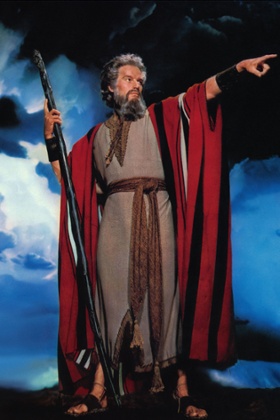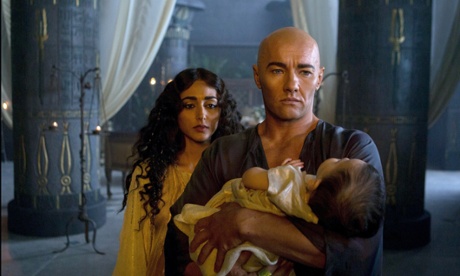| Exodus: Gods and Kings (2014) | |
|---|---|
 | Rating: 6.7/10 (5,509 votes) Director: Ridley Scott Writer: Adam Cooper, Bill Collage, Jeffrey Caine, Steven Zaillian Stars: Christian Bale, Joel Edgerton, John Turturro, Aaron Paul Runtime: 150 min Rated: PG-13 Genre: Action, Adventure, Drama Released: 12 Dec 2014 |
| Plot: Epic adventure Exodus: Gods and Kings is the story of one man's daring courage to take on the might of an empire. Using state of the art visual effects and 3D immersion, Scott brings new life to the story of the defiant leader Moses as he rises up against the Egyptian Pharaoh Ramses, setting 600,000 slaves on a monumental journey of escape from Egypt and its terrifying cycle of deadly plagues. | |
Exodus: Gods and Kings (2014) watch online from Youtube.com
style="display:inline-block;width:320px;height:100px"
data-ad-client="ca-pub-7698183303596681"
data-ad-slot="5667385653">
This week, big-budget Hollywood epic Exodus: Gods and Kings was banned in Egypt. “It gives a Zionist view of history and contains historical inaccuracies and that’s why we have decided to ban it,” explained culture minister Gaber Asfour. Reportedly, cinemas in Morocco have also been forbidden to show the film. This comes after one of the most extraordinary cinematic controversies of recent years: the spat over Kim Jong-Un assassination movie The Interview, which allegedly provoked the Sony Pictures hacking scandal and has drawn the governments of the United States and North Korea into a diplomatic contretemps.
The Interview is fantasy rather than history, but it does feature as a major character someone who is real, alive and apparently quite upset about the whole business. Films that deal with real characters or events are often controversial, whether or not the people involved are around to object. The Hollywood film U-571 (2000), in which the Royal Navy’s capture of an Enigma machine during the second world war is falsely attributed to an American crew (including chief engineer Jon Bon Jovi), was denounced in parliament by prime minister Tony Blair. Black Hawk Down, Exodus director Ridley Scott’s 2001 dramatisation of the battle of Mogadishu, was taken to task by the president of Pakistan Pervez Musharraf for its perceived slights against his nation’s troops. Recently, there has been criticism of this year’s Oscar hopeful The Imitation Game for its dubious portrayal of computing pioneer and war hero Alan Turing. The film turns him from the engaging, often witty and openly gay man he really was into a socially dysfunctional recluse, unable to understand jokes and shamed by his own sexuality. It also mixes him up with the Cambridge spy ring in a way that seriously impugns his historical reputation – and is completely untrue. Turing never met John Cairncross, the real-life Soviet spy who is positioned as one of his closest colleagues in the movie.

Meanwhile, Exodus: Gods and Kings has been annoying people since before its release, notably when it announced an almost entirely white cast to play its Middle Eastern and African characters. “I can’t mount a film of this budget … and say that my lead actor is Mohammad so-and-so from such-and-such,” director Ridley Scott told Variety. “I’m just not going to get it financed.” This may have been an accurate reflection of the prejudices of some financiers, but it did nothing to quell public criticism. In the final cut, the white actors look ludicrous under caked-on bronzer, their inauthentically blue eyes emphasised by heavy Egyptian kohl. It only adds to the movie’s clunky, 1950s feel: it has all the puffed-up high camp of a Charlton Heston swords-and-sandals epic, without any of the fun.
Is the film historically inaccurate, though, as the Egyptian culture minister charges? In the first place, most historians would not treat the Book of Exodus as an entirely literal or reliable source. The story of Moses may have some truth at its core, but it is buried in layers of bronze age vagueness and myth. For instance, the Bible does not name the pharaoh (or pharaohs) of Exodus. More than half a dozen historical candidates have been proposed, including Ahmose I, Thutmose II, Thutmose III, Amenhotep II and Akhenaten. Like earlier Hollywood Moses movies The Ten Commandments (1956) and Prince of Egypt (1998), Exodus: Gods and Kings identifies Rameses II as the pharaoh. Even if you accept that, it is difficult not to giggle at Rameses as played by Australian actor Joel Edgerton, flouncing around in gold chiffon nighties and at one point wrapping himself in an albino python in the manner of Britney Spears. The poor man looks like an accounts manager from Surbiton on his way to the office party in ill-advised fancy dress. He’s not alone. John Turturro, as his father Seti I, seems barely to be convincing himself. Sigourney Weaver, as his mother Tuya, grimly maintains a straight face while wearing a chicken on her head. Nobody is enjoying themselves. Least of all the audience.

The film stages a foray into the historical record with a visually impressive recreation of the battle of Kadesh, circa 1274 BC, fought by the Egyptians against the Hittites in what is now Syria. Kadesh is sometimes said to have been the largest chariot battle ever fought, with thousands of chariots on both sides. The real Rameses II commanded the Egyptian forces. There is no suggestion in the Bible or history that Moses was present. In the film, Moses (played by Christian Bale) is Rameses’ adopted brother, a prince and a general. It puts him at the centre of the battle, saving the day.
After Kadesh, Moses returns to Egypt, where Jewish slaves are working away on some monuments, colossal statues and a pyramid. This has been a fraught issue in Egypt at least since Israeli prime minister Menachem Begin claimed in 1977 that Israel’s forefathers built the pyramids. It is one of the main things that has irritated the Egyptian culture minister now, and he has a point. The famous pyramids at Giza, Sakkara, Abu Sir and other major Egyptian locations were mostly built between the 27th and 24th century BC, hundreds of years before any Jews arrived in Egypt. The historical Moses, if he existed, is commonly estimated to have lived at some point around the 14th to 13th century BC. The Bible claims that Israelite slaves built two cities, not the pyramids; and many modern historians and archaeologists dispute the idea that the pyramids were built by slave labour at all. Evidence from tombs suggests workers were paid, well nourished and buried with honour, perhaps indicating that these were skilled craftsmen rather than slaves.
The allegation about Jews and pyramids may be the basis on which the Egyptian culture minister has accused the film of Zionism – because much of Exodus: Gods and Kings is surprisingly down on Judaism. After realising that he himself is a Jew by birth, Moses climbs a holy mountain. There is an avalanche, and he is hit several times on the head by big rocks. Dazed and submerged comically in some mud, he sees God – who, in this film, is represented by a mean-tempered 11-year-old boy.
Exodus: Gods and Kings repeatedly suggests that Moses is hallucinating his connection with God, and that the god he hallucinates is not very nice. The existence of God isn’t a question historians tend to tangle themselves up in. Given that the audiences for religious movies are largely religious themselves, though, casting doubt on it is a curious production decision. The Book of Exodus is full of supernatural events that depend on divine intervention: sticks turning into snakes, rivers turning into blood, children being saved by the sacrifice of lambs, pillars of fire illuminating the desert night, seas parting and so forth. Historians may raise their eyebrows but, as far as most film-makers are concerned, these are the good bits. (In The Ten Commandments, though, Cecil B DeMille only managed four plagues: he couldn’t work out how to do frogs, flies, lice, boils, locusts or the death of livestock with the special-effects technology of the 1950s.)

Moses tells Rameses to free the slaves. “From an economic standpoint alone, what you’re asking is problematic to say the least,” says Rameses, who speaks like an accounts manager from Surbiton as well as looking like one. Onscreen, Moses wages a guerrilla war against the Egyptians. As he blows up warehouses and ships in spectacular yet ahistorical fashion, viewers may wonder: is this film trying to suggest Moses was a terrorist? Meanwhile, Exodus: Gods and Kings never quite figures out how it’s going to deal with the magic stuff, and fudges it. The plagues are strikingly recreated from a visual effects point of view, but one of Rameses’ cronies pops up to provide boring rational explanations for them; and the Red Sea just sort of goes away of its own accord.
One problem for those who try to ban movies is that this may only increase their appeal. The Interview took a reported $15m (£9.8m) in online sales in its first week, after alleged North Korean attempts to get it pulled from cinemas transformed it from a witless farce into an expression of free speech. Exodus: Gods and Kings has performed modestly so far. It took the No 1 spot at the US box office, but with $24.5m in first-week takings scored significantly lower than comparable biblical epics The Passion of the Christ ($83.8m) and Noah ($43.7m). Perhaps the film-makers are even hoping that controversy might help it make a decent return on its $140m budget. On its own merits, this unfocused, pompous and silly take on biblical history might all too quickly be forgotten.
guardian.co.uk © Guardian News & Media Limited 2010
Published via the Guardian News Feed plugin for WordPress.
Does Exodus: Gods and Kings deserve to be banned for historical inaccuracy? - Watch Movie Online











0 comments:
Post a Comment